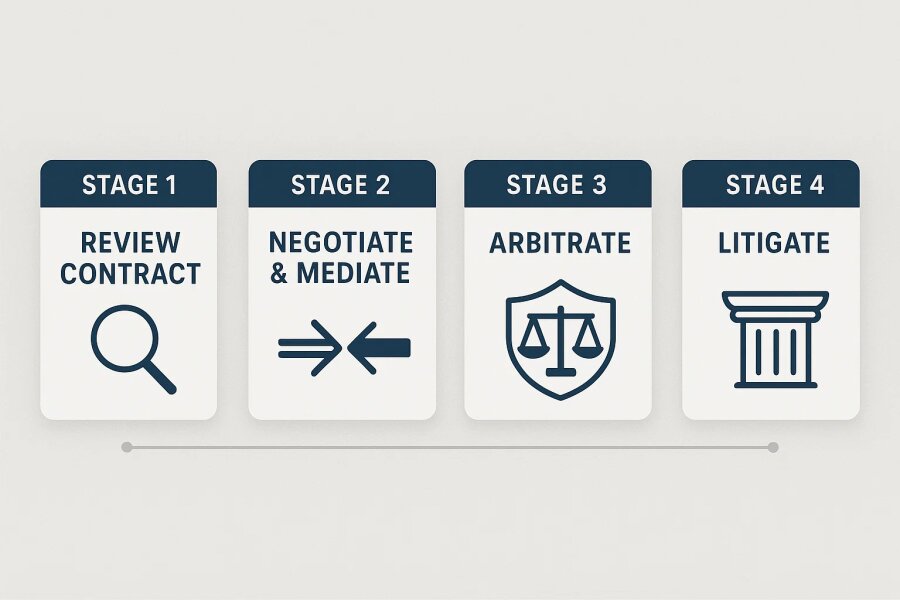Table of Contents
Introduction: Navigating Business Disagreements
Understanding the Legal Framework in 2025
A Step-by-Step Guide to Dispute Resolution
- Step One: Review the Contract Thoroughly
- Step Two: Attempt Negotiation and Mediation
- Step Three: Arbitration in the UAE
- Step Four: Litigation in UAE Courts
Common Causes of Commercial Contract Disputes
The Role of Free Zones in Dispute Resolution
Practical Tips for Businesses Facing a Dispute
How Lawyers Add Value
Looking Ahead: The Future of UAE Commercial Law
Conclusion: Protecting Your Business Interests
Commercial contracts are the cornerstone of conducting business in the United Arab Emirates (UAE). Whether you are a multinational entering the Dubai market or a local firm cooperating with suppliers, agreements establish obligations, payment conditions, and risk allocation. Despite careful formulation, conflicts might emerge. When they occur, understanding how to manage corporate legal issues in the UAE swiftly and efficiently is crucial to safeguarding your economic interests.
In this piece, we discuss the essential procedures, choices, and legal frameworks for settling a commercial contract dispute in Dubai and throughout the UAE in 2025. We will cover negotiation, mediation, arbitration, and litigation, and illustrate how organizations may deal with UAE commercial law to get a fair resolution.

Understanding the Legal Framework in 2025
The UAE’s legal system integrates civil law traditions with Sharia principles, reinforced by federal and emirate-level rules. For business concerns, organizations must largely follow the UAE Civil Transactions Law and the Commercial Transactions Law.
In 2025, UAE commercial law continues to improve in accordance with global best practices, prioritizing transparency, investor trust, and efficiency in dispute resolution. For companies, this means more formal methods are available to remedy breaches of contract in the UAE, whether via courts or alternative dispute resolution (ADR).
For tailored legal guidance, many companies turn to UAE commercial lawyers who specialise in corporate and contract matters.

Step One: Review the Contract Thoroughly
The first step in settling any disagreement is to reread the contract itself. UAE law gives primacy to the written agreement between parties, provided it does not interfere with obligatory legislation or public order. Key elements to examine include:
- Governing law and jurisdiction clauses – Does the contract state UAE law, free zone rules, or international arbitration?
- Notice requirements – Are there specific timelines for notifying the other party of a breach?
- Remedies and penalties – Does the contract define compensation, liquidated damages, or termination rights?
A detailed analysis frequently indicates whether the problem arises from misunderstanding, non-performance, or an explicit violation of contract in the UAE. At this point, engaging a business lawyer may assist evaluate if informal settlement or legal action is the appropriate approach.
Step Two: Attempt Negotiation and Mediation
Negotiation is the most cost-effective and time-efficient technique to settle conflicts. Many commercial conflicts come from cash flow concerns, supplier delays, or changing company circumstances. Direct discussion may frequently repair confidence and sustain the connection.
If negotiations stall, mediation is a possibility. Mediation includes a neutral third person that fosters conversation and suggests solutions, while the conclusion is not legally enforceable until documented in a settlement agreement. The UAE has implemented mediation-friendly programs, and parties may voluntarily agree to this technique before advancing to arbitration or court.
The official UAE government portal highlights the growing use of alternative methods to settle disputes, which help businesses avoid lengthy litigation.
Step Three: Arbitration in the UAE
Arbitration has become the preferred procedure for many enterprises operating in Dubai and the greater UAE. The country is a worldwide commercial center, and overseas investors generally want arbitration provisions in contracts to assure impartiality, timeliness, and enforceability.

UAE Arbitration Law
The UAE published Federal Law No. 6 of 2018 on Arbitration, which modernized processes and matched them with international norms. The legislation applies to both local and international arbitrations, providing the seat of arbitration is the UAE or UAE law regulates the agreement.
Arbitration offers several advantages:
- Confidential proceedings protect sensitive business information.
- Decisions are binding and enforceable once recognised by UAE courts.
- Parties can choose expert arbitrators with industry-specific knowledge.
Key Arbitration Centres
Several institutions administer arbitration in the UAE, including:
- Dubai International Arbitration Centre (DIAC) – A leading body for commercial contract disputes in Dubai.
- Abu Dhabi Commercial Conciliation and Arbitration Centre – Handling trade disputes through conciliation and arbitration.
- Sharjah International Commercial Arbitration Centre (Tahkeem) – Serving companies across the northern emirates.
- International Islamic Centre for Reconciliation and Arbitration (IICRA) – Specialising in financial and Islamic law disputes.
For many, arbitration provides a middle ground between informal negotiation and the rigour of business litigation in the UAE.
Step Four: Litigation in UAE Courts
When settlement is impossible and arbitration is not an option, litigation remains the final recourse. Court proceedings in the UAE are conducted in Arabic, which means official translations of contracts and evidence are required.

Jurisdiction of UAE Courts
The UAE has a dual system:
- Federal courts apply in most emirates.
- Local courts operate in Dubai, Abu Dhabi, and Ras Al Khaimah.
In addition, Dubai and Abu Dhabi host English-language common law courts in their financial free zones (DIFC and ADGM). These courts are particularly popular for international commercial cases, as their procedures resemble those of common law jurisdictions.
Process of Business Litigation in the UAE
The general litigation process involves:
- Filing a claim with the court of jurisdiction.
- Exchange of pleadings and evidence between parties.
- Hearings conducted before a panel of judges.
- Judgment issued, which may include damages, specific performance, or contract termination.
Appeals are possible, but litigation can be lengthy and expensive. Businesses often weigh the risks carefully before committing to court action.
Common Causes of Commercial Contract Disputes
While each case is unique, many business legal disputes in the UAE stem from similar issues:
- Non-payment or delayed payment for goods and services.
- Failure to deliver according to agreed timelines or specifications.
- Termination disagreements, where one party claims valid termination and the other disputes it.
- Force majeure events, especially relevant during global crises or regional disruptions.
- Misrepresentation or fraud in business dealings.
Understanding the root cause is vital for selecting the most effective resolution strategy.
The Role of Free Zones
Many contracts in Dubai and the UAE involve companies registered in free zones such as DIFC, JAFZA, or DMCC. These zones often provide their own arbitration rules and specialised courts. For example, DIFC Courts recognise and enforce judgments from many international jurisdictions, making them attractive for foreign investors.
Businesses operating in free zones must pay special attention to whether their dispute falls under free zone jurisdiction or UAE federal law. A commercial lawyer familiar with both systems can help clarify the appropriate path.

Practical Tips for Businesses Facing a Dispute
Resolving a commercial contract dispute in Dubai or elsewhere in the UAE requires careful planning. Here are practical steps businesses should consider:
- Preserve evidence – Keep records of emails, invoices, delivery notes, and communications.
- Act promptly – Many contracts and laws impose strict timelines for notification and claims.
- Assess reputational risk – Consider whether public litigation may harm your business relationships.
- Consider settlement early – Even during arbitration or litigation, settlement remains an option.
- Seek legal advice – Working with UAE corporate and commercial lawyers ensures compliance with procedures and maximises your chance of a favourable outcome.
How Lawyers Add Value
While some businesses attempt to resolve disputes internally, professional legal support is invaluable. Lawyers experienced in business litigation in the UAE bring:
- Knowledge of local laws and court practices.
- Experience in drafting arbitration agreements and enforcing awards.
- Negotiation skills to reach settlements before costs escalate.
- Guidance on risk management, helping businesses avoid similar disputes in future contracts.
Engaging a lawyer early often saves time and money compared to pursuing litigation without expert representation.
Looking Ahead in Terms of UAE Commercial Law
The UAE government continues to reform its legal system to attract global investment. Recent initiatives include:
- Enhancing arbitration enforcement procedures.
- Expanding specialised courts, such as those for consumer protection and information technology.
- Increasing digitalisation of case management to speed up proceedings.
For companies, this implies increased clarity and speed in resolving conflicts. Companies entering the UAE market in 2025 should anticipate a more predictable legal environment, albeit cultural and procedural variations still demand cautious management.
Protecting Your Business Interests
Commercial contract disputes are an unavoidable hazard of conducting business. What matters most is how fast and strategically they are addressed. In the UAE, firms have access to a broad combination of negotiation, mediation, arbitration, and lawsuit alternatives. The option relies on the nature of the disagreement, the value at risk, and the connection between the parties.
By analyzing contracts carefully, maintaining documentation, and employing professional legal counsel, companies may safeguard their rights and prevent disruption. For corporations seeking help, Lawzana links businesses to corporate and commercial attorneys in the UAE who can offer personalized advice and representation.
Disputes may be challenging, but with the correct assistance and knowledge of UAE commercial law in 2025, they can be addressed in a manner that secures your company interests and maintains long-term development.



